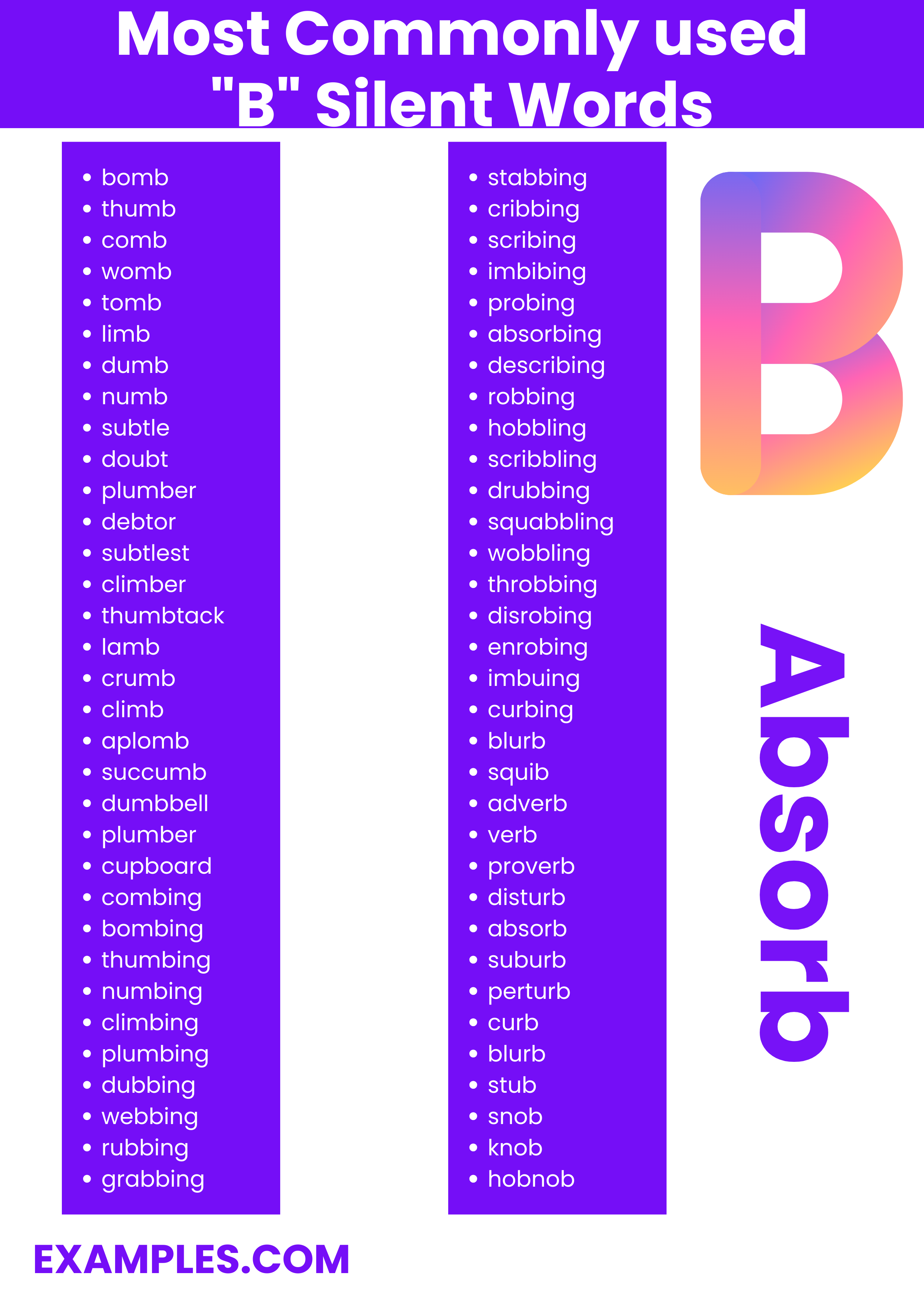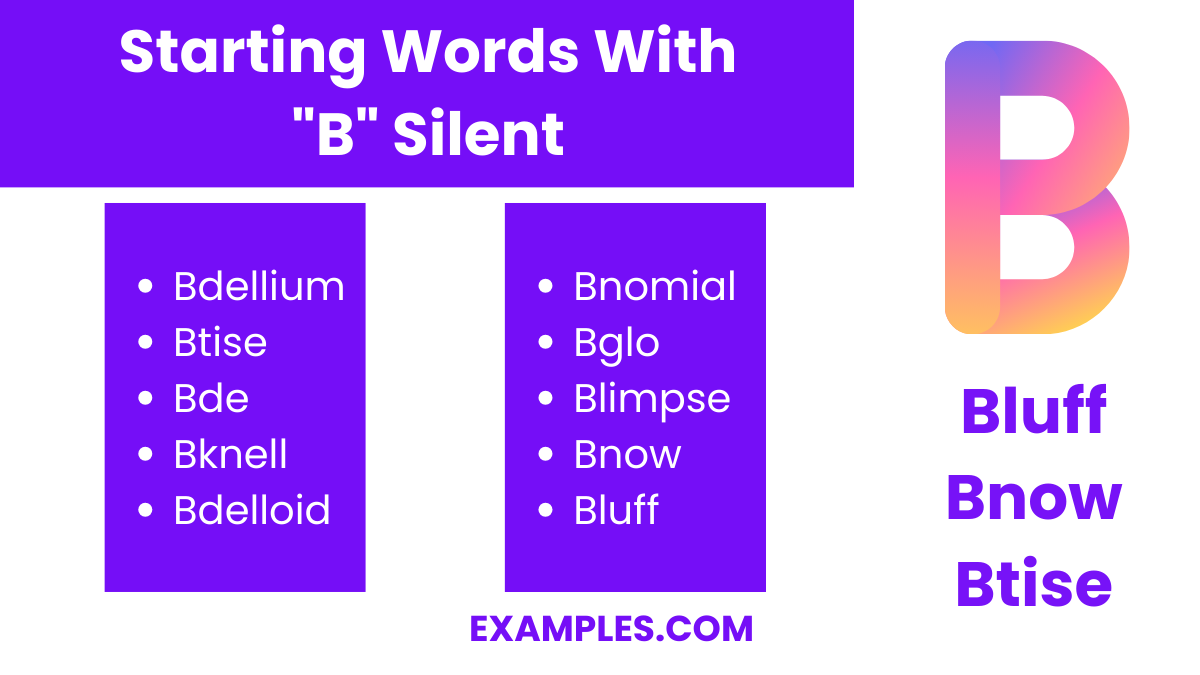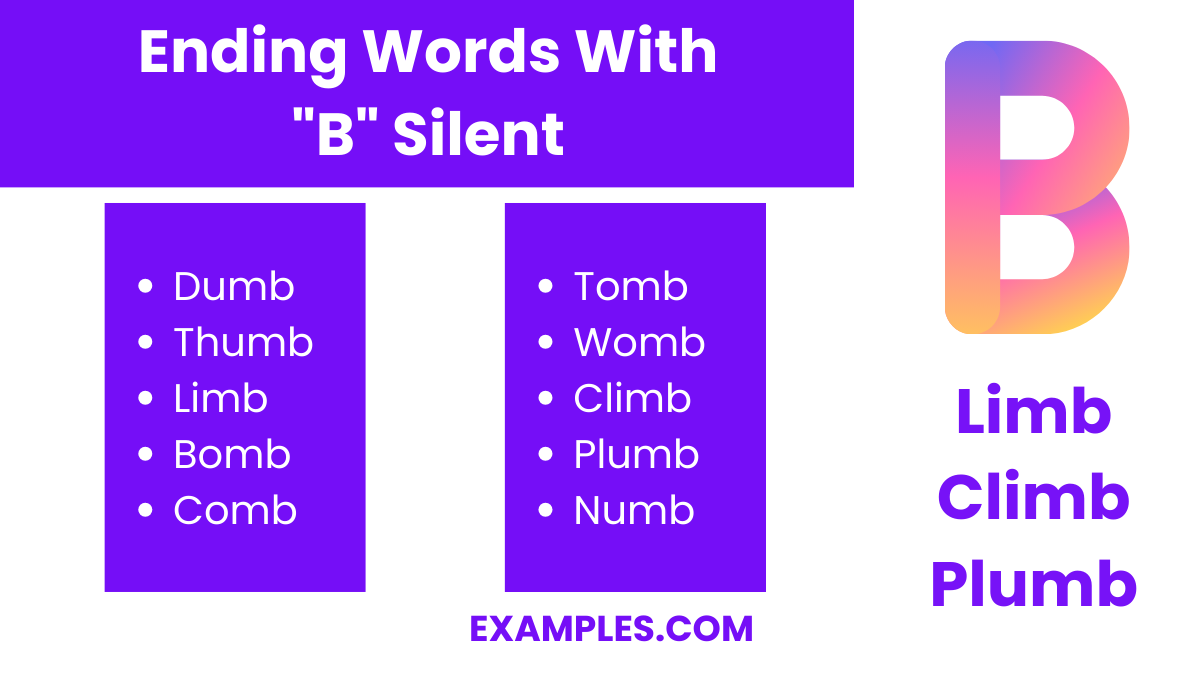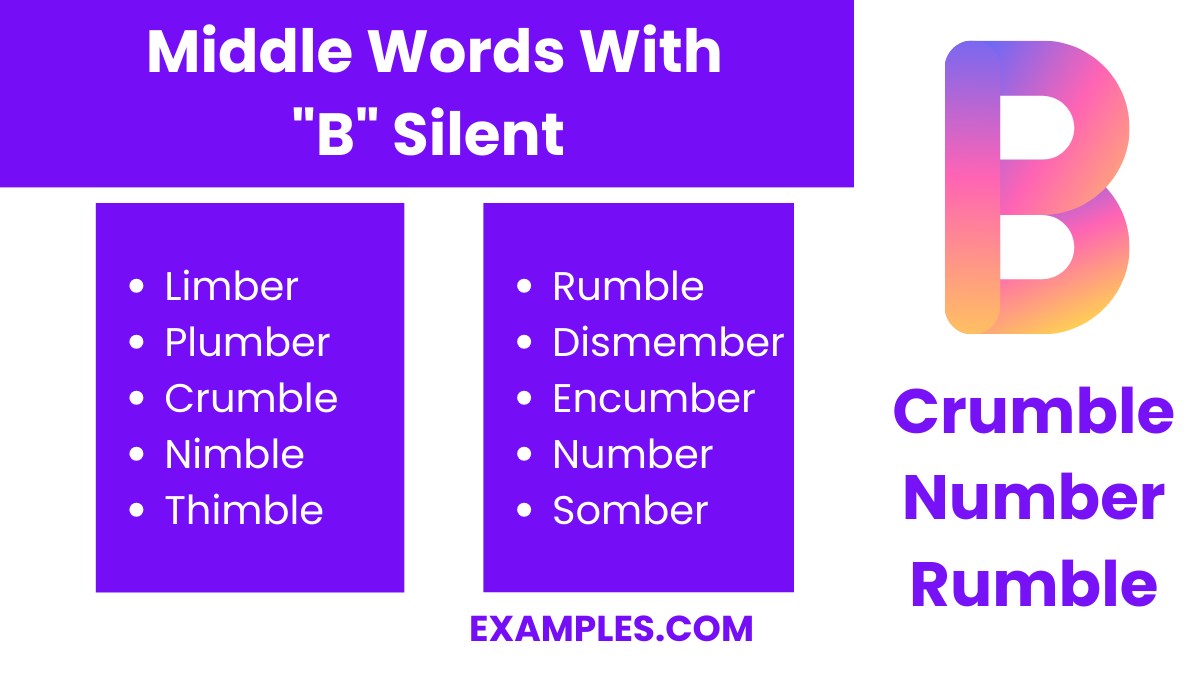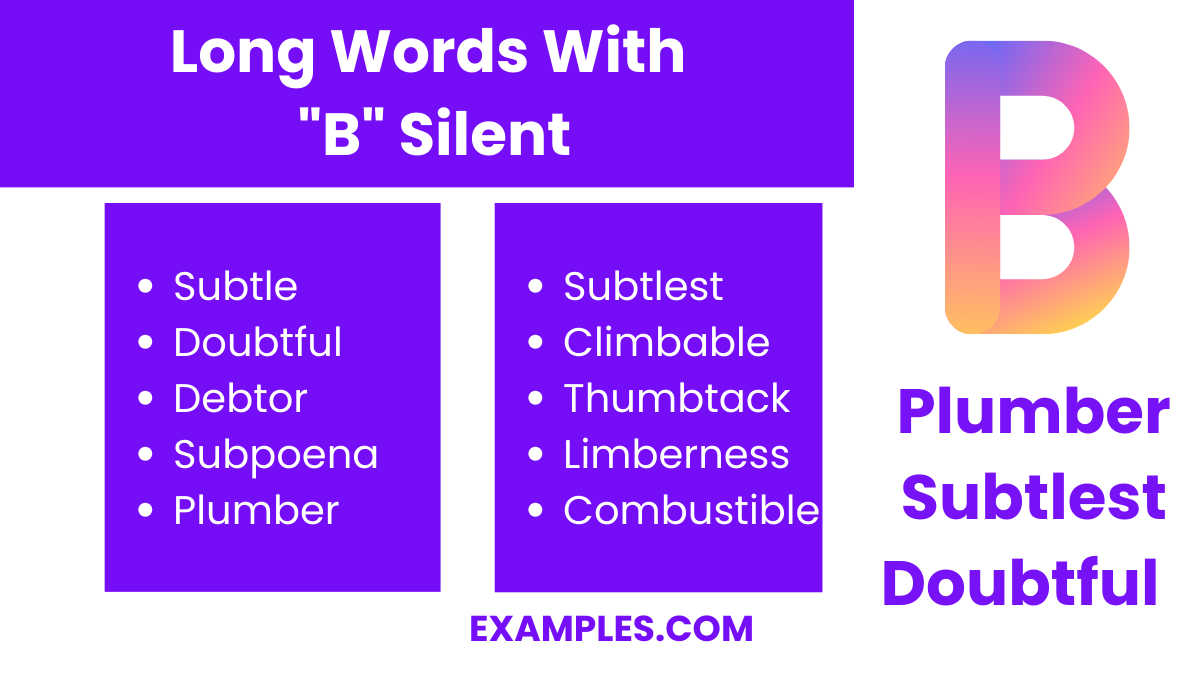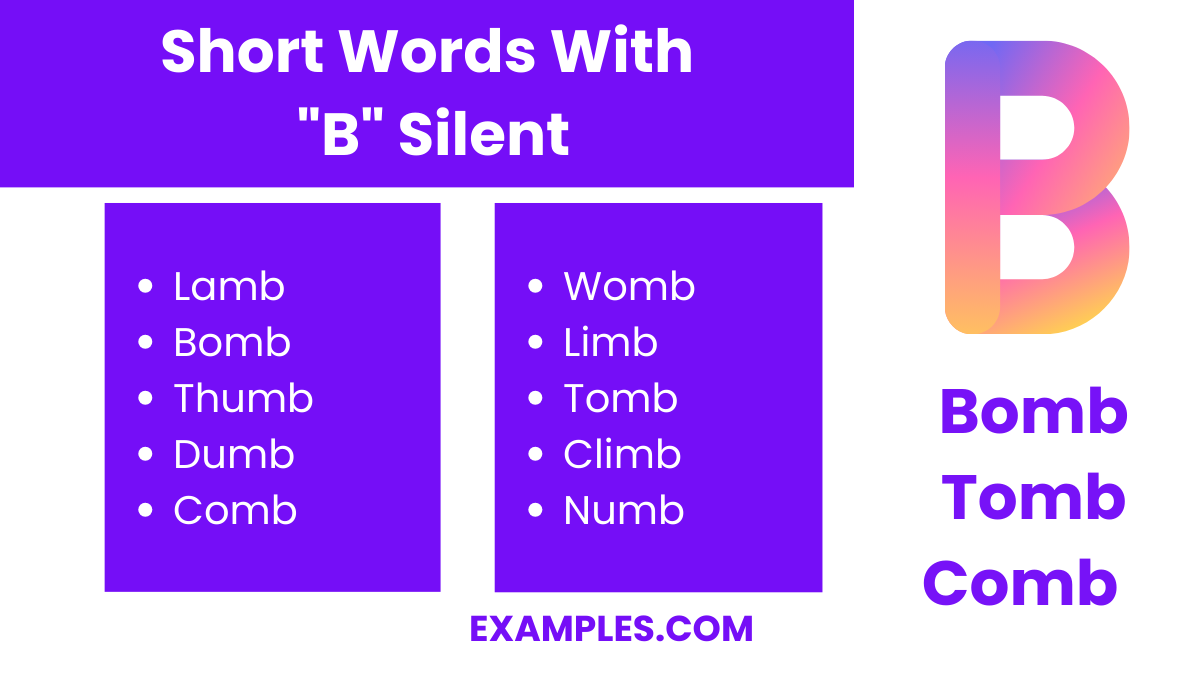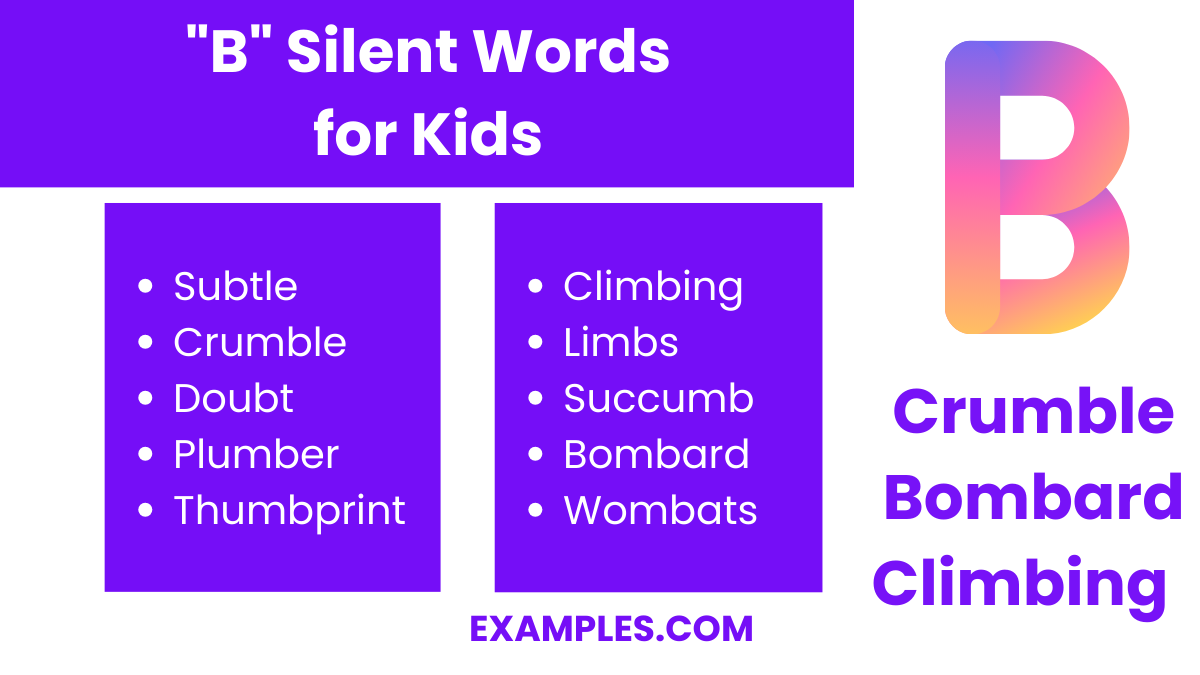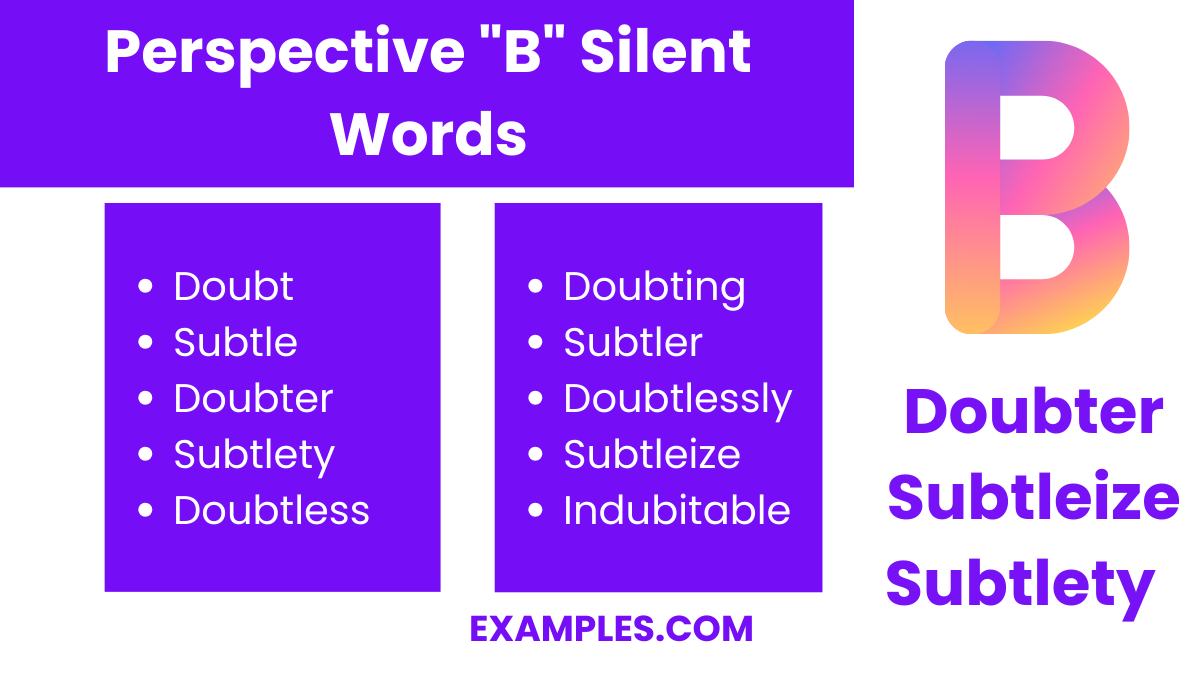450+ B Silent Words List, Meaning, PDF
The English language is a treasure trove of peculiarities, one of which is the silent “B” words. This linguistic quirk occurs when the letter “B” is written but not pronounced, adding a layer of complexity and intrigue to the language. From subtle nuances in everyday words to unexpected surprises in less common terms, the silent “B” weaves its silent spell across the lexicon. Explore this fascinating feature with us as we delve into a variety of words that showcase this unique characteristic, enriching your vocabulary and offering insights into the whimsical nature of English phonetics.
Download Most Commonly Used B Silent Words - PDF
50+ Most Commonly used “B” Silent Words
Embarking on the exploration of silent “B” words opens a window into the nuanced and often surprising aspects of English phonetics, especially within the realm of daily use English words. This unique feature of the language, where the “B” is written but remains unspoken, is found in a variety of words that are integral to everyday communication as well as more specialized vocabularies. The silent “B” often traces back to historical linguistic shifts and etymologies, making these words not only fascinating from a phonetic standpoint but also rich in linguistic heritage. Below is a curated list of commonly used words featuring a silent “B”, complete with phonetic transcriptions to aid in pronunciation. This extensive compilation serves as a valuable resource for educators, students, and language enthusiasts, enhancing both understanding and spoken fluency in everyday contexts.
| bomb | /bɒm/ | thumb | /θʌm/ | comb | /koʊm/ |
| womb | /wuːm/ | tomb | /tuːm/ | limb | /lɪm/ |
| dumb | /dʌm/ | numb | /nʌm/ | subtle | /ˈsʌt(ə)l/ |
| doubt | /daʊt/ | plumber | /ˈplʌmə(r)/ | debtor | /ˈdɛtə(r)/ |
| subtlest | /ˈsʌt(ə)lst/ | climber | /ˈklaɪmə(r)/ | thumbtack | /ˈθʌmtæk/ |
| lamb | /læm/ | crumb | /krʌm/ | climb | /klaɪm/ |
| aplomb | /əˈplɒm/ | succumb | /səˈkʌm/ | dumbbell | /ˈdʌmbel/ |
| plumber | /ˈplʌmər/ | cupboard | /ˈkʌbərd/ | combing | /ˈkoʊmɪŋ/ |
| bombing | /ˈbɒmɪŋ/ | thumbing | /ˈθʌmɪŋ/ | numbing | /ˈnʌmɪŋ/ |
| climbing | /ˈklaɪmɪŋ/ | plumbing | /ˈplʌmɪŋ/ | dubbing | /ˈdʌbɪŋ/ |
| webbing | /ˈwɛbɪŋ/ | rubbing | /ˈrʌbɪŋ/ | grabbing | /ˈɡræbɪŋ/ |
| stabbing | /ˈstæbɪŋ/ | cribbing | /ˈkrɪbɪŋ/ | scribing | /ˈskraɪbɪŋ/ |
| imbibing | /ɪmˈbaɪbɪŋ/ | probing | /ˈproʊbɪŋ/ | absorbing | /əbˈzɔːrbɪŋ/ |
| describing | /dɪˈskraɪbɪŋ/ | robbing | /ˈrɒbɪŋ/ | hobbling | /ˈhɒblɪŋ/ |
| scribbling | /ˈskrɪblɪŋ/ | drubbing | /ˈdrʌbɪŋ/ | squabbling | /ˈskwɒblɪŋ/ |
| wobbling | /ˈwɒblɪŋ/ | throbbing | /ˈθrɒbɪŋ/ | disrobing | /dɪsˈroʊbɪŋ/ |
| enrobing | /ɪnˈroʊbɪŋ/ | imbuing | /ɪmˈbjuːɪŋ/ | curbing | /ˈkɜːrbɪŋ/ |
| blurb | /blɜːb/ | squib | /skwɪb/ | adverb | /ˈædvɜːb/ |
| verb | /vɜːb/ | proverb | /ˈprɒvɜːb/ | disturb | /dɪˈstɜːb/ |
| absorb | /əbˈzɔːb/ | suburb | /ˈsʌbɜːb/ | perturb | /pəˈtɜːb/ |
| curb | /kɜːb/ | blurb | /blɜːb/ | stub | /stʌb/ |
| snob | /snɒb/ | knob | /nɒb/ | hobnob | /ˈhɒbnɒb/ |
| job | /dʒɒb/ | rob | /rɒb/ | sob | /sɒb/ |
| cob | /kɒb/ | gobble | /ˈɡɒb(ə)l/ | hobble | /ˈhɒb(ə)l/ |
| wobble | /ˈwɒb(ə)l/ | bobble | /ˈbɒb(ə)l/ | cobweb | /ˈkɒbwɛb/ |
| slob | /slɒb/ | glob | /ɡlɒb/ | throb | /θrɒb/ |
| knob | /nɒb/ | snob | /snɒb/ | job | /dʒɒb/ |
| rob | /rɒb/ | sob | /sɒb/ | cob | /kɒb/ |
This table presents a diverse array of words incorporating a silent “B,” spanning from everyday terms to more specific jargon, each accompanied by its phonetic pronunciation to assist in mastering their correct enunciation.
Starting Words With “B” Silent
Dive into the intriguing realm of English where the initial “B” stays silent, a phenomenon that often puzzles both native speakers and learners. This exploration delves into words with a silent starting “B”, enriching your vocabulary and offering a unique twist to pronunciation. Ideal for educators aiming to demystify English phonetics for students, these examples not only highlight the silent “B” at the beginning of words but also integrate the concept of rhyming words, enhancing linguistic understanding and pronunciation skills. This approach provides a multifaceted learning experience, combining the challenge of silent letters with the lyrical aspect of rhymes, thereby deepening the engagement with language and its phonetic quirks.
- Bdellium (/ˈdɛliəm/) – a resin obtained from certain trees, used in perfumes and medicines.
- Btise (/ˈbaɪts/) – a rare word meaning to coax or to deceive.
- Bde (/bəˈdeɪ/) – an uncommon variant of ‘bade’, the past tense of ‘bid’.
- Bknell (/nɛl/) – an imaginative term for the sound of a bell, especially a funeral bell.
- Bdelloid (/ˈdɛlɔɪd/) – relating to a group of microscopic, water-dwelling organisms.
- Bnomial (/nəʊˈmaɪəl/) – a playful take on ‘binomial’, a term from mathematics.
- Bglo (/ˈɡloʊ/) – a creative spelling for ‘glow’, suggesting a silent ‘b’ at the start.
- Blimpse (/ɡlɪmps/) – an imaginative word for a quick, incomplete view or look.
- Bnow (/naʊ/) – a fictional word, representing ‘now’ with an unconventional silent ‘b’.
- Bluff (/lʌf/) – typically spelled without a ‘b’, but here it’s an inventive variant suggesting a silent ‘b’.
Ending Words With “B” Silent
Venture into the realm of silent “B”s at the end of words, a subtle yet fascinating aspect of English pronunciation, particularly evident in praising words that are key to positive reinforcement in educational settings. This section is tailored for educators aiming to deepen students’ understanding of English phonetics. These examples, where the “B” at the end remains unvoiced, serve as an excellent tool for teaching the nuances of word endings, enhancing both spelling and pronunciation competencies.
- Dumb (/dʌm/) – unable to speak; lacking the power of speech.
- Thumb (/θʌm/) – the short, thick first digit of the human hand.
- Limb (/lɪm/) – an arm or leg of a person or four-legged animal.
- Bomb (/bɒm/) – an explosive weapon detonated by impact, proximity to an object, a timing mechanism, or other means.
- Comb (/koʊm/) – a toothed device used for styling, cleaning, and managing hair or fur.
- Tomb (/tuːm/) – a large vault or chamber for burying the dead.
- Womb (/wuːm/) – the organ in females for containing and nourishing the fetus during pregnancy.
- Climb (/klaɪm/) – to ascend or go up using the feet and, often, the hands.
- Plumb (/plʌm/) – to measure the depth of water or investigate something thoroughly.
- Numb (/nʌm/) – deprived of the power of sensation; not feeling, or unable to feel.
Middle Words With “B” Silent
In the fascinating world of English language learning, focusing on the peculiarities of spelling and pronunciation can significantly enhance a student’s understanding and communication skills. Among these peculiarities, silent letters, particularly the silent “b” in the middle of words, stand as a testament to the rich history and evolution of the language. This guide is crafted for teachers who are passionate about equipping their peers and students with the tools to navigate the intricacies of English pronunciation and spelling, incorporating encouraging words to foster a positive and supportive learning environment.
- Limber – /ˈlɪmər/ – Flexible and agile; easily bent.
- Plumber – /ˈplʌmər/ – A person who installs and repairs the pipes and fittings of water supply, sanitation, or heating systems.
- Crumble – /ˈkrʌmbl/ – To break or fall apart into small fragments, especially over a period of time as part of a process of deterioration.
- Nimble – /ˈnɪmbəl/ – Quick and light in movement or action; agile.
- Thimble – /ˈθɪmbəl/ – A small metal or plastic cap with a closed end, worn to protect the finger and push the needle in sewing.
- Rumble – /ˈrʌmbəl/ – A continuous deep, resonant sound.
- Dismember – /dɪsˈmɛmbər/ – Cut off the limbs of (a person or animal).
- Encumber – /ɪnˈkʌmbər/, /ɛn-/ – Restrict or burden (someone or something) in such a way that free action or movement is difficult.
- Number – /ˈnʌmbər/ – An arithmetical value, expressed by a word, symbol, or figure, representing a particular quantity and used in counting and making calculations.
- Somber – /ˈsɒmbər/ (US), /ˈsɒmbə/ (UK) – Dark or dull in color or tone; gloomy.
Long Words With “B” Silent
Delve into the fascinating world of long words where the “B” remains a silent observer, adding a layer of complexity and elegance to the English language, particularly through describing words that enrich narratives and analyses. This selection is curated for educators looking to challenge students and expand their vocabulary with words that not only intrigue but also demonstrate the silent “B”‘s role in English phonetics.
- Subtle (/ˈsʌtəl/) – so delicate or precise as to be difficult to describe or understand.
- Doubtful (/ˈdaʊtfəl/) – feeling uncertain about something or lacking conviction.
- Debtor (/ˈdɛtər/) – a person who owes money to another.
- Subpoena (/səˈpiːnə/) – a writ ordering a person to attend a court.
- Plumber (/ˈplʌmər/) – a person who fits and repairs the pipes, fittings, and other apparatus of water supply, sanitation, or heating systems.
- Subtlest (/ˈsʌtəlst/) – most delicately intricate and not obvious.
- Climbable (/ˈklaɪməbəl/) – able to be climbed.
- Thumbtack (/ˈθʌmtæk/) – a short pin with a broad, flat head, used to pin papers to a board or wall.
- Limberness (/ˈlɪmbərnəs/) – the quality of being limber; flexibility.
- Combustible (/kəmˈbʌstəbəl/) – capable of catching fire and burning; inflammable.
Short Words With “B” Silent
Explore the quirky and concise world of short words featuring a silent “B”. This section, designed for educators, focuses on bite-sized vocabulary that conceals the silent “B” within, offering a fun and accessible way for students to engage with phonetics. These words are perfect for learners at all levels, providing a foundation for understanding the unpredictability and charm of English pronunciation and spelling.
- Lamb – /læm/ – A young sheep.
- Bomb – /bɒm/ (UK), /bɑːm/ (US) – An explosive weapon.
- Thumb – /θʌm/ – The first digit of the human hand.
- Dumb – /dʌm/ – Lacking the ability to speak.
- Comb – /koʊm/ – A tool used for styling hair.
- Womb – /wuːm/ – The organ in females for gestating offspring.
- Limb – /lɪm/ – An arm or leg.
- Tomb – /tuːm/ – A grave or space for burial.
- Climb – /klaɪm/ – To ascend or go up.
- Numb – /nʌm/ – Deprived of the power of sensation.
“B” Silent Words for Kids
Introduce young learners to the whimsical world of silent “B” words, where the “B” plays hide and seek in the spelling but stays quiet in the pronunciation. This selection is crafted for educators and parents to make learning English fun and engaging for kids. These words, chosen for their simplicity and relevance to children’s everyday vocabulary, are perfect for building a solid foundation in phonetics and spelling. Engage your young students with these charming examples that illustrate the silent “B,” making language learning a delightful adventure.
- Subtle – /ˈsʌt(ə)l/ – When something is not obvious or is hard to notice. The “B” in this word is quiet.
- Crumble – /ˈkrʌmbl/ – To break into small pieces. We don’t hear the “B” when we say it.
- Doubt – /daʊt/ – To be unsure or have questions about something. The “B” is silent.
- Plumber – /ˈplʌmər/ – A person who fixes or installs water pipes and toilets. The “B” is not pronounced.
- Thumbprint – /ˈθʌmprɪnt/ – The mark left by the pattern of lines on the tip of a thumb. The “B” is silent.
- Climbing – /ˈklaɪmɪŋ/ – The activity of going up something. The “B” in “climbing” is quiet.
- Limbs – /lɪmz/ – The arms and legs of a person or the large branches of a tree. We don’t say the “B.”
- Succumb – /səˈkʌm/ – To give in to something, like falling asleep or losing in a game. The “B” is silent.
- Bombard – /bɒmˈbɑːrd/ – To attack continuously, as in asking someone lots of questions. The “B” at the start is pronounced, but it’s included for its educational contrast.
- Wombats – /ˈwʊmbæts/ – A type of Australian animal that looks a bit like a small bear. The “B” is pronounced here, but the word is fun for kids to learn about silent “B” exceptions
Perspective “B” Silent Words
Immerse yourself in the nuanced realm of perspective words where the silent “B” adds depth and context. This collection is tailored for educators seeking to enrich students’ vocabulary with words that not only challenge their pronunciation skills but also offer new viewpoints and understandings. These words, each bearing the silent “B”, are gateways to exploring complex ideas, encouraging learners to look beyond the surface and appreciate the intricacies of language and thought.
- Doubt (/daʊt/) – to be uncertain about something.
- Subtle (/ˈsʌtəl/) – delicately complex and understated.
- Doubter (/ˈdaʊtər/) – a person who is uncertain or lacks conviction.
- Subtlety (/ˈsʌtl̩ti/) – the quality of being difficult to detect or analyze.
- Doubtless (/ˈdaʊtləs/) – without doubt; certainly.
- Doubting (/ˈdaʊtɪŋ/) – feeling uncertain about something.
- Subtler (/ˈsʌtlər/) – more finely nuanced or less obvious.
- Doubtlessly (/ˈdaʊtləsli/) – in a way that is certain or without doubt.
- Subtleize (/ˈsʌtl̩aɪz/) – to make or become subtle or more refined.
- Indubitable (/ɪnˈdjuːbɪtəbl/) – impossible to doubt; unquestionable.
In conclusion, exploring words with a silent “B” reveals the fascinating quirks of English phonetics, offering learners of all ages a unique linguistic journey. From whimsical terms that ignite children’s imaginations to complex words that challenge advanced speakers, the silent “B” serves as a silent guide through the intricacies of language, enriching vocabulary and enhancing pronunciation skills in a subtle yet impactful way.
450+ B Silent Words List, Meaning, PDF

The English language is a treasure trove of peculiarities, one of which is the silent “B” words. This linguistic quirk occurs when the letter “B” is written but not pronounced, adding a layer of complexity and intrigue to the language. From subtle nuances in everyday words to unexpected surprises in less common terms, the silent “B” weaves its silent spell across the lexicon. Explore this fascinating feature with us as we delve into a variety of words that showcase this unique characteristic, enriching your vocabulary and offering insights into the whimsical nature of English phonetics.
Download Most Commonly Used B Silent Words - PDF
50+ Most Commonly used “B” Silent Words
Embarking on the exploration of silent “B” words opens a window into the nuanced and often surprising aspects of English phonetics, especially within the realm of daily use English words. This unique feature of the language, where the “B” is written but remains unspoken, is found in a variety of words that are integral to everyday communication as well as more specialized vocabularies. The silent “B” often traces back to historical linguistic shifts and etymologies, making these words not only fascinating from a phonetic standpoint but also rich in linguistic heritage. Below is a curated list of commonly used words featuring a silent “B”, complete with phonetic transcriptions to aid in pronunciation. This extensive compilation serves as a valuable resource for educators, students, and language enthusiasts, enhancing both understanding and spoken fluency in everyday contexts.
bomb | /bɒm/ | thumb | /θʌm/ | comb | /koʊm/ |
womb | /wuːm/ | tomb | /tuːm/ | limb | /lɪm/ |
dumb | /dʌm/ | numb | /nʌm/ | subtle | /ˈsʌt(ə)l/ |
doubt | /daʊt/ | plumber | /ˈplʌmə(r)/ | debtor | /ˈdɛtə(r)/ |
subtlest | /ˈsʌt(ə)lst/ | climber | /ˈklaɪmə(r)/ | thumbtack | /ˈθʌmtæk/ |
lamb | /læm/ | crumb | /krʌm/ | climb | /klaɪm/ |
aplomb | /əˈplɒm/ | succumb | /səˈkʌm/ | dumbbell | /ˈdʌmbel/ |
plumber | /ˈplʌmər/ | cupboard | /ˈkʌbərd/ | combing | /ˈkoʊmɪŋ/ |
bombing | /ˈbɒmɪŋ/ | thumbing | /ˈθʌmɪŋ/ | numbing | /ˈnʌmɪŋ/ |
climbing | /ˈklaɪmɪŋ/ | plumbing | /ˈplʌmɪŋ/ | dubbing | /ˈdʌbɪŋ/ |
webbing | /ˈwɛbɪŋ/ | rubbing | /ˈrʌbɪŋ/ | grabbing | /ˈɡræbɪŋ/ |
stabbing | /ˈstæbɪŋ/ | cribbing | /ˈkrɪbɪŋ/ | scribing | /ˈskraɪbɪŋ/ |
imbibing | /ɪmˈbaɪbɪŋ/ | probing | /ˈproʊbɪŋ/ | absorbing | /əbˈzɔːrbɪŋ/ |
describing | /dɪˈskraɪbɪŋ/ | robbing | /ˈrɒbɪŋ/ | hobbling | /ˈhɒblɪŋ/ |
scribbling | /ˈskrɪblɪŋ/ | drubbing | /ˈdrʌbɪŋ/ | squabbling | /ˈskwɒblɪŋ/ |
wobbling | /ˈwɒblɪŋ/ | throbbing | /ˈθrɒbɪŋ/ | disrobing | /dɪsˈroʊbɪŋ/ |
enrobing | /ɪnˈroʊbɪŋ/ | imbuing | /ɪmˈbjuːɪŋ/ | curbing | /ˈkɜːrbɪŋ/ |
blurb | /blɜːb/ | squib | /skwɪb/ | adverb | /ˈædvɜːb/ |
verb | /vɜːb/ | proverb | /ˈprɒvɜːb/ | disturb | /dɪˈstɜːb/ |
absorb | /əbˈzɔːb/ | suburb | /ˈsʌbɜːb/ | perturb | /pəˈtɜːb/ |
curb | /kɜːb/ | blurb | /blɜːb/ | stub | /stʌb/ |
snob | /snɒb/ | knob | /nɒb/ | hobnob | /ˈhɒbnɒb/ |
job | /dʒɒb/ | rob | /rɒb/ | sob | /sɒb/ |
cob | /kɒb/ | gobble | /ˈɡɒb(ə)l/ | hobble | /ˈhɒb(ə)l/ |
wobble | /ˈwɒb(ə)l/ | bobble | /ˈbɒb(ə)l/ | cobweb | /ˈkɒbwɛb/ |
slob | /slɒb/ | glob | /ɡlɒb/ | throb | /θrɒb/ |
knob | /nɒb/ | snob | /snɒb/ | job | /dʒɒb/ |
rob | /rɒb/ | sob | /sɒb/ | cob | /kɒb/ |
This table presents a diverse array of words incorporating a silent “B,” spanning from everyday terms to more specific jargon, each accompanied by its phonetic pronunciation to assist in mastering their correct enunciation.
Starting Words With “B” Silent
Dive into the intriguing realm of English where the initial “B” stays silent, a phenomenon that often puzzles both native speakers and learners. This exploration delves into words with a silent starting “B”, enriching your vocabulary and offering a unique twist to pronunciation. Ideal for educators aiming to demystify English phonetics for students, these examples not only highlight the silent “B” at the beginning of words but also integrate the concept of rhyming words, enhancing linguistic understanding and pronunciation skills. This approach provides a multifaceted learning experience, combining the challenge of silent letters with the lyrical aspect of rhymes, thereby deepening the engagement with language and its phonetic quirks.
Bdellium (/ˈdɛliəm/) – a resin obtained from certain trees, used in perfumes and medicines.
Btise (/ˈbaɪts/) – a rare word meaning to coax or to deceive.
Bde (/bəˈdeɪ/) – an uncommon variant of ‘bade’, the past tense of ‘bid’.
Bknell (/nɛl/) – an imaginative term for the sound of a bell, especially a funeral bell.
Bdelloid (/ˈdɛlɔɪd/) – relating to a group of microscopic, water-dwelling organisms.
Bnomial (/nəʊˈmaɪəl/) – a playful take on ‘binomial’, a term from mathematics.
Bglo (/ˈɡloʊ/) – a creative spelling for ‘glow’, suggesting a silent ‘b’ at the start.
Blimpse (/ɡlɪmps/) – an imaginative word for a quick, incomplete view or look.
Bnow (/naʊ/) – a fictional word, representing ‘now’ with an unconventional silent ‘b’.
Bluff (/lʌf/) – typically spelled without a ‘b’, but here it’s an inventive variant suggesting a silent ‘b’.
Ending Words With “B” Silent
Venture into the realm of silent “B”s at the end of words, a subtle yet fascinating aspect of English pronunciation, particularly evident in praising words that are key to positive reinforcement in educational settings. This section is tailored for educators aiming to deepen students’ understanding of English phonetics. These examples, where the “B” at the end remains unvoiced, serve as an excellent tool for teaching the nuances of word endings, enhancing both spelling and pronunciation competencies.
Dumb (/dʌm/) – unable to speak; lacking the power of speech.
Thumb (/θʌm/) – the short, thick first digit of the human hand.
Limb (/lɪm/) – an arm or leg of a person or four-legged animal.
Bomb (/bɒm/) – an explosive weapon detonated by impact, proximity to an object, a timing mechanism, or other means.
Comb (/koʊm/) – a toothed device used for styling, cleaning, and managing hair or fur.
Tomb (/tuːm/) – a large vault or chamber for burying the dead.
Womb (/wuːm/) – the organ in females for containing and nourishing the fetus during pregnancy.
Climb (/klaɪm/) – to ascend or go up using the feet and, often, the hands.
Plumb (/plʌm/) – to measure the depth of water or investigate something thoroughly.
Numb (/nʌm/) – deprived of the power of sensation; not feeling, or unable to feel.
Middle Words With “B” Silent
In the fascinating world of English language learning, focusing on the peculiarities of spelling and pronunciation can significantly enhance a student’s understanding and communication skills. Among these peculiarities, silent letters, particularly the silent “b” in the middle of words, stand as a testament to the rich history and evolution of the language. This guide is crafted for teachers who are passionate about equipping their peers and students with the tools to navigate the intricacies of English pronunciation and spelling, incorporating encouraging words to foster a positive and supportive learning environment.
Limber – /ˈlɪmər/ – Flexible and agile; easily bent.
Plumber – /ˈplʌmər/ – A person who installs and repairs the pipes and fittings of water supply, sanitation, or heating systems.
Crumble – /ˈkrʌmbl/ – To break or fall apart into small fragments, especially over a period of time as part of a process of deterioration.
Nimble – /ˈnɪmbəl/ – Quick and light in movement or action; agile.
Thimble – /ˈθɪmbəl/ – A small metal or plastic cap with a closed end, worn to protect the finger and push the needle in sewing.
Rumble – /ˈrʌmbəl/ – A continuous deep, resonant sound.
Dismember – /dɪsˈmɛmbər/ – Cut off the limbs of (a person or animal).
Encumber – /ɪnˈkʌmbər/, /ɛn-/ – Restrict or burden (someone or something) in such a way that free action or movement is difficult.
Number – /ˈnʌmbər/ – An arithmetical value, expressed by a word, symbol, or figure, representing a particular quantity and used in counting and making calculations.
Somber – /ˈsɒmbər/ (US), /ˈsɒmbə/ (UK) – Dark or dull in color or tone; gloomy.
Long Words With “B” Silent
Delve into the fascinating world of long words where the “B” remains a silent observer, adding a layer of complexity and elegance to the English language, particularly through describing words that enrich narratives and analyses. This selection is curated for educators looking to challenge students and expand their vocabulary with words that not only intrigue but also demonstrate the silent “B”‘s role in English phonetics.
Subtle (/ˈsʌtəl/) – so delicate or precise as to be difficult to describe or understand.
Doubtful (/ˈdaʊtfəl/) – feeling uncertain about something or lacking conviction.
Debtor (/ˈdɛtər/) – a person who owes money to another.
Subpoena (/səˈpiːnə/) – a writ ordering a person to attend a court.
Plumber (/ˈplʌmər/) – a person who fits and repairs the pipes, fittings, and other apparatus of water supply, sanitation, or heating systems.
Subtlest (/ˈsʌtəlst/) – most delicately intricate and not obvious.
Climbable (/ˈklaɪməbəl/) – able to be climbed.
Thumbtack (/ˈθʌmtæk/) – a short pin with a broad, flat head, used to pin papers to a board or wall.
Limberness (/ˈlɪmbərnəs/) – the quality of being limber; flexibility.
Combustible (/kəmˈbʌstəbəl/) – capable of catching fire and burning; inflammable.
Short Words With “B” Silent
Explore the quirky and concise world of short words featuring a silent “B”. This section, designed for educators, focuses on bite-sized vocabulary that conceals the silent “B” within, offering a fun and accessible way for students to engage with phonetics. These words are perfect for learners at all levels, providing a foundation for understanding the unpredictability and charm of English pronunciation and spelling.
Lamb – /læm/ – A young sheep.
Bomb – /bɒm/ (UK), /bɑːm/ (US) – An explosive weapon.
Thumb – /θʌm/ – The first digit of the human hand.
Dumb – /dʌm/ – Lacking the ability to speak.
Comb – /koʊm/ – A tool used for styling hair.
Womb – /wuːm/ – The organ in females for gestating offspring.
Limb – /lɪm/ – An arm or leg.
Tomb – /tuːm/ – A grave or space for burial.
Climb – /klaɪm/ – To ascend or go up.
Numb – /nʌm/ – Deprived of the power of sensation.
“B” Silent Words for Kids
Introduce young learners to the whimsical world of silent “B” words, where the “B” plays hide and seek in the spelling but stays quiet in the pronunciation. This selection is crafted for educators and parents to make learning English fun and engaging for kids. These words, chosen for their simplicity and relevance to children’s everyday vocabulary, are perfect for building a solid foundation in phonetics and spelling. Engage your young students with these charming examples that illustrate the silent “B,” making language learning a delightful adventure.
Subtle – /ˈsʌt(ə)l/ – When something is not obvious or is hard to notice. The “B” in this word is quiet.
Crumble – /ˈkrʌmbl/ – To break into small pieces. We don’t hear the “B” when we say it.
Doubt – /daʊt/ – To be unsure or have questions about something. The “B” is silent.
Plumber – /ˈplʌmər/ – A person who fixes or installs water pipes and toilets. The “B” is not pronounced.
Thumbprint – /ˈθʌmprɪnt/ – The mark left by the pattern of lines on the tip of a thumb. The “B” is silent.
Climbing – /ˈklaɪmɪŋ/ – The activity of going up something. The “B” in “climbing” is quiet.
Limbs – /lɪmz/ – The arms and legs of a person or the large branches of a tree. We don’t say the “B.”
Succumb – /səˈkʌm/ – To give in to something, like falling asleep or losing in a game. The “B” is silent.
Bombard – /bɒmˈbɑːrd/ – To attack continuously, as in asking someone lots of questions. The “B” at the start is pronounced, but it’s included for its educational contrast.
Wombats – /ˈwʊmbæts/ – A type of Australian animal that looks a bit like a small bear. The “B” is pronounced here, but the word is fun for kids to learn about silent “B” exceptions
Perspective “B” Silent Words
Immerse yourself in the nuanced realm of perspective words where the silent “B” adds depth and context. This collection is tailored for educators seeking to enrich students’ vocabulary with words that not only challenge their pronunciation skills but also offer new viewpoints and understandings. These words, each bearing the silent “B”, are gateways to exploring complex ideas, encouraging learners to look beyond the surface and appreciate the intricacies of language and thought.
Doubt (/daʊt/) – to be uncertain about something.
Subtle (/ˈsʌtəl/) – delicately complex and understated.
Doubter (/ˈdaʊtər/) – a person who is uncertain or lacks conviction.
Subtlety (/ˈsʌtl̩ti/) – the quality of being difficult to detect or analyze.
Doubtless (/ˈdaʊtləs/) – without doubt; certainly.
Doubting (/ˈdaʊtɪŋ/) – feeling uncertain about something.
Subtler (/ˈsʌtlər/) – more finely nuanced or less obvious.
Doubtlessly (/ˈdaʊtləsli/) – in a way that is certain or without doubt.
Subtleize (/ˈsʌtl̩aɪz/) – to make or become subtle or more refined.
Indubitable (/ɪnˈdjuːbɪtəbl/) – impossible to doubt; unquestionable.
In conclusion, exploring words with a silent “B” reveals the fascinating quirks of English phonetics, offering learners of all ages a unique linguistic journey. From whimsical terms that ignite children’s imaginations to complex words that challenge advanced speakers, the silent “B” serves as a silent guide through the intricacies of language, enriching vocabulary and enhancing pronunciation skills in a subtle yet impactful way.


